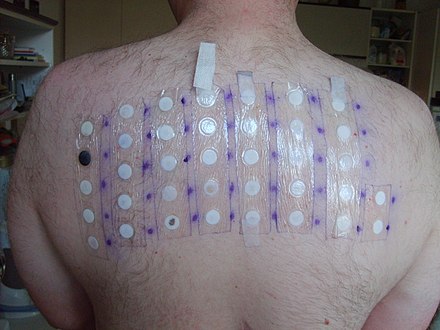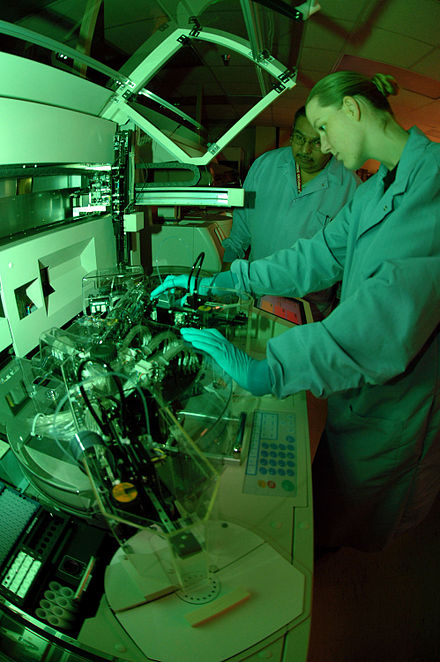Allergy
Introduction
Allergies, or allergic diseases, are conditions where the immune system reacts to typically harmless substances in the environment. These hypersensitive reactions can manifest in various forms, including hay fever, food allergies, atopic dermatitis, allergic asthma, and anaphylaxis.
Symptoms vary widely and may include red eyes, itchy rashes, sneezing, coughing, runny nose, shortness of breath, or swelling. Common allergens include pollen, certain foods, metals, insect stings, and medications.

Signs and Symptoms
Allergy symptoms depend on the affected organ and the type of allergen. For instance:
- Nose: Swelling of the nasal mucosa, runny nose, sneezing.
- Eyes: Redness, itching, watery discharge.
- Airways: Sneezing, coughing, bronchoconstriction, wheezing, dyspnea.
- Ears: Fullness, pain, impaired hearing.
- Skin: Rashes, eczema, hives.
- Gastrointestinal tract: Abdominal pain, bloating, vomiting, diarrhoea.

Causes
Allergies arise from a combination of genetic and environmental factors. Genetic predisposition plays a very important role, as allergic diseases tend to run in families. Environmental factors include exposure to allergens, pollution, changes in diet, and lifestyle. Dust mites, certain foods, latex, medications, insect stings, and toxins like urushiol from poison ivy can trigger allergic reactions.
Pathophysiology
The allergic response involves a type I hypersensitivity reaction, where initial exposure to an allergen sensitises the immune system. Subsequent exposure leads to the release of inflammatory mediators such as histamine, causing symptoms. Mast cells and basophils play key roles in this process. An acute response can be followed by a late-phase response, involving other immune cells like eosinophils and macrophages.

Diagnosis
Skin Prick Testing
This involves introducing tiny amounts of allergens into the skin using a small plastic or metal device. A positive reaction, indicating allergy, is marked by redness and swelling at the test site.

Patch Testing
Used to identify contact dermatitis, this method involves applying adhesive patches treated with potential allergens to the skin and observing reactions over 48 to 96 hours.

Blood Testing
Allergy blood tests measure specific IgE antibodies in the blood and can detect multiple allergens from a single sample. This method is safe and suitable for all ages.
Treatment
Medications
Various medications are used to block allergic mediators or prevent cell activation. Common treatments include:
- Antihistamines
- Glucocorticoids
- Epinephrine (adrenaline)
- Mast cell stabilisers
- Antileukotriene agents
An epinephrine autoinjector is often used for severe anaphylactic reactions.
Immunotherapy
This involves exposing patients to increasing amounts of allergen to modify the immune response. It is effective for environmental allergies, insect stings, and asthma but not recommended for food allergies.

Alternative Medicine
Experimental treatments like enzyme potentiated desensitisation (EPD) and homoeopathic treatments have not shown conclusive effectiveness. Saline nasal irrigation and butterbur have been found somewhat effective.
Epidemiology
Allergic diseases have increased in the Western world over recent decades, with significant prevalence in both the United States and the United Kingdom. This rise is attributed to changes in environmental and lifestyle factors, supporting the hygiene hypothesis.

Medical Specialty
Allergists are physicians specialising in managing and treating allergies, asthma, and related diseases. In the UK, allergy is a subspecialty of general medicine or paediatrics, requiring extensive training and certification.

Self-assessment MCQs (single best answer)
Which of the following is a common symptom of allergic rhinitis (hay fever)?
What type of hypersensitivity reaction is involved in allergies?
Which of the following cells play a key role in the allergic response by releasing histamine?
What is the purpose of immunotherapy in the treatment of allergies?
Which diagnostic method is used to identify contact dermatitis?
An epinephrine autoinjector is commonly used for which type of allergic reaction?
Which environmental factor is NOT commonly associated with the development of allergies?
According to the hygiene hypothesis, the increase in allergic diseases in the Western world is attributed to:
What is the role of allergens in the pathophysiology of allergies?
Which of the following treatments has not shown conclusive effectiveness in treating allergies?
Dentaljuce
Dentaljuce provides Enhanced Continuing Professional Development (CPD) with GDC-approved Certificates for dental professionals worldwide.
Founded in 2009 by the award-winning Masters team from the School of Dentistry at the University of Birmingham, Dentaljuce has established itself as the leading platform for online CPD.
With over 100 high-quality online courses available for a single annual membership fee, Dentaljuce offers comprehensive e-learning designed for busy dental professionals.
The courses cover a complete range of topics, from clinical skills to patient communication, and are suitable for dentists, nurses, hygienists, therapists, students, and practice managers.
Dentaljuce features Dr. Aiden, a dentally trained AI-powered personal tutor available 24/7 to assist with queries and provide guidance through complex topics, enhancing the learning experience.
Check out our range of courses, or sign up now!


